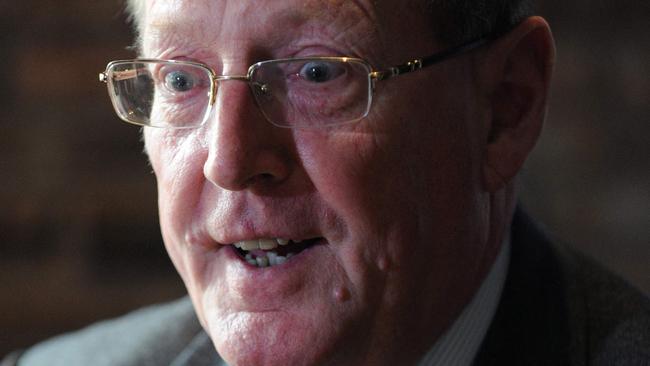David Trimble helped end The Troubles that blighted his homeland
David Trimble was elevated to the House of Lords having negotiated the peace that had eluded Northern Ireland for 30 years.

The Anglo-Norman invasion of Ireland starting in 1169 succeeded partly because the Irish were not a unified force. The notion of unity in Ireland has appeared incompatible ever since.
And in the manner that debate over a carbon tax has torn down a few Australian prime ministers, the “Irish problem” has claimed leaders of the United Kingdom: William Pitt in 1801 and William Gladstone in 1894 for a start.
It hasn’t helped that some have taunted the Irish. In 1921, Winston Churchill rose in the House of Commons and said of Ireland: “It is a small, poor, sparsely populated island, lapped about by British sea power.”
The divisions of Ireland – historic, geographic, religious – have appeared overwhelming, its politics always played for keeps. The Easter Uprising of 1916 and martial law and executions that followed invested in later strife. The Anglo-Irish Treaty five years after was a flimsy fix. With 1948’s Republic of Ireland Act, the south’s soul was restored but cleaved from the contradictory North and its insoluble, man-made frictions.
The problem was simple: the North’s Catholics, commonly republicans, were in the minority – Protestants, mostly Unionists and inclined to stay with the UK, were in the majority.
Starting on August 12, 1969, when the annual Apprentice Boys of Derry march headed into the mostly Catholic Bogside area, riots broke out lasting three days. The British army was brought in to try to restore peace. This ignited paramilitaries on both sides. The Troubles had started. David Trimble was 24.
He grew up in County Down and after Bangor Grammar School studied law at Queens University of Belfast, receiving first-class honours. He became a barrister, lectured at Queens and rose to become dean of law.
In his 20s he joined the Vanguard Unionist Progressive Party, perceived as the extreme right-wing of Ulster unionism and whose founder, William Craig, once warned his members might one day “liquidate the enemy”. In 1973 Trimble was a candidate in a Northern Ireland Assembly election, coming last with 446 votes.
He joined the mainstream, but still hardline, Ulster Unionist Party. One of his young law department colleagues, Edgar Graham, was a rising star of the party it was assumed he would one day lead. Fearing the gifted, articulate Graham might seek democratic peace in Northern Ireland, the Provisional Irish Republican Army killed him on campus on December 7, 1983. Trimble heard the shots and looked out a window to see his friend dead and the assassins fleeing. Later he learned he too was on their to-kill list.
Trimble rose through UUP ranks – becoming a member of the Commons in 1990 – but it was still a surprise to many when he emerged as party leader in 1995. By then he had witnessed the generational carnage of the Troubles and sought change, quickly and unexpectedly. He still took part in one of the Protestant summer marches but also travelled to Dublin to meet Ireland’s prime minister, becoming the first UUP leader in 30 years to do so.
He met US president Bill Clinton in Washington and in 1997 agreed to sit down with Sinn Fein republicans – that hadn’t happened in 74 years.
That year, weeks apart, Ireland’s Bertie Ahern and Britain’s Tony Blair each became prime ministers, both baby boomers for whom the Troubles had cast a shadow over most of their lives.
With the encouragement of Clinton, who controversially had allowed Sinn Fein president Gerry Adams visa access to the US, impetus was given to working out peace in direct talks between the UK and Irish governments and the political forces of Northern Ireland. Leading the UUP delegates, Trimble, joined by the esteemed John Hume, Catholic co-founder and then leader of the nationalist Social Democratic and Labour Party, hammered out the deals to be known as the Good Friday Agreement of 1998 that largely ended the Troubles that had claimed 3500 lives. They shared that year’s Nobel Peace Prize and Trimble was elected first minister (designate) of the new Northern Ireland Assembly.
Trimble also was a regular at the annual Australia-Israel-UK Leadership Dialogues organised in Jerusalem by Melbourne businessman Albert Dadon, and Trimble’s calm wisdom shone through as the delegates discussed issues of mutual interest.
I last saw him in 2019. We had taken a bus to the Dead Sea and sat together at a small outdoor bar drinking a pint of Goldstar lager and looking across into Jordan.
“David, you’re good at fixing things. Can you fix this?” I asked, sweeping my arm back across Israel and the Palestinian territories. He wasn’t sure: “You need goodwill on all sides.”
David Trimble, lawyer and politician, born Belfast, October 15, 1944; died July 25, aged 77.




To join the conversation, please log in. Don't have an account? Register
Join the conversation, you are commenting as Logout